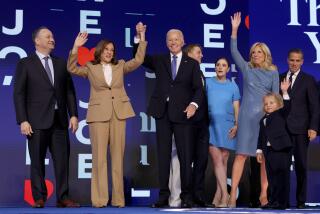Saying Uncle and Mouthing Bromides
Inevitably maudlin, cliche-ridden and disorganized, concession and victory speeches are essential features of the democratic drama, clamored for by impatient journalists ready to explode in outrage should the winner vaingloriously “declare victory” before his vanquished foe “graciously” concedes defeat.
On Wednesday, George W. Bush and John F. Kerry delivered -- in proper order -- classics of the genre and, this year in particular, the theatrical formality of the highly stylized ritual conveyed an important symbolism. Journalists, academics and politicians decried the 2004 campaign as uniquely divisive and injurious, producing bitterness, profound chasms, separate nations and tectonic fragmentation among Americans. Identical observations are made every four years. But the 2004 race did have a special feature: the genuinely fearful backdrop of terrorism and an actual war.
Election campaigns are routinely described in military metaphors: the warring parties marshaling foot soldiers to combat the enemy. In this election, the connection between metaphor and reality was clear, and the mass media were adept in exploiting the emotional resonance and visual imagery of each to intensify the other. It was tantalizing to allow the language of the war on terror, as well as terrorism’s fear and uncertainty, to be reflected in slogans, sound bites and T-shirts: “Vote or Die.”
Yet in every election a nation is divided; its “union” is constitutionally suspended and temporarily dissolved. Democracy does this. As a needful anticlimax to the election campaign, the concession speech is a patriotic call to commence the task of binding still-fresh wounds and erasing battle lines.
Thus Kerry duly played the part of vanquished but soon-to-be-ennobled foe. He phoned the victor with gracious words of congratulation, initiating the process of healing. Choosing a red tie for the occasion showed that he had already made a symbolic acceptance of the “sea of red” on the screen the previous night. He assured the nation that the first words between them concerned “the danger of division in our country and the need -- the desperate need -- for unity, for finding the common ground, coming together.”
That task accomplished, it was the victor’s turn. Bush, sporting a blue tie to return Kerry’s sartorial gesture, was becalmed, no longer the rampant champion fighting for the nation’s survival against a rival who threatened our freedom and national purpose. Now he spoke respectfully of a worthy opponent: “We had a very good phone call. He was very gracious. Sen. Kerry waged a spirited campaign, and he and his supporters can be proud of their efforts.”
On cue, the victor was chastened by the struggle and the ensuing responsibilities: “America has spoken, and I’m humbled by the trust and confidence of my fellow citizens....I want to speak to every person who voted for my opponent. To make this nation stronger, better, I will need your support and I will work to earn it. I will do all I can to deserve your trust.... We have one country, one Constitution, and one future that binds us.”
There are farcical elements in every election campaign, but defeat for at least one man is a high tragedy in which we all participate. The epilogue’s rhetoric provides a democratic catharsis that is, like democracy itself, better than many alternatives.
More to Read
Only good movies
Get the Indie Focus newsletter, Mark Olsen's weekly guide to the world of cinema.
You may occasionally receive promotional content from the Los Angeles Times.










